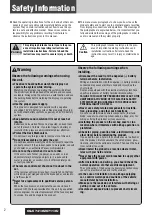
16
16
16
16
16
16
16
16
AMPLIFIER WITH DUAL 4 OUTPUTS
4 SPEAKERS PER CHANNEL CONNECTED IN PARALLEL
Example of Low-Impedance System Configuration
+
_
+
_
To next speaker
From amp
Jumper has been removed
Jumper stored here for safe keeping
Total load impedance can be calculated this way:
Rs is the impedance of the speaker, for the A
1
2 it is equal to
1
6 ohms.
Note: If all speakers are the same Rs , it is simply:
Low-impedance amplifiers have power ratings based on driving a particular load
impedance, typically a 4-ohm load. Some rate power into an 8-ohm load. If the
speaker load’s impedance is greater than the amplifier’s rated impedance, the
speaker will not consume the amplifier’s total rated power. Since the A
1
2 is a
1
6-ohm speaker, operating a single A
1
2 with an amplifier rated for 4 ohms will
result in the A
1
2 speaker consuming only
1
/4 of the amplifier’s maximum capac-
ity. Likewise a single A
1
2 will consume only
1
/2 of the power capacity of an am-
plifier’s 8-ohm power rating. Most real world applications will require more
than a single A
1
2, and paralleling the speakers will decrease the total impedance
of the load as mentioned above.
(1/Rs + 1/Rs ... 1/Rs)
1
= Total Load Impedance
# of Speakers
Rs
= Total Load Impedance


























